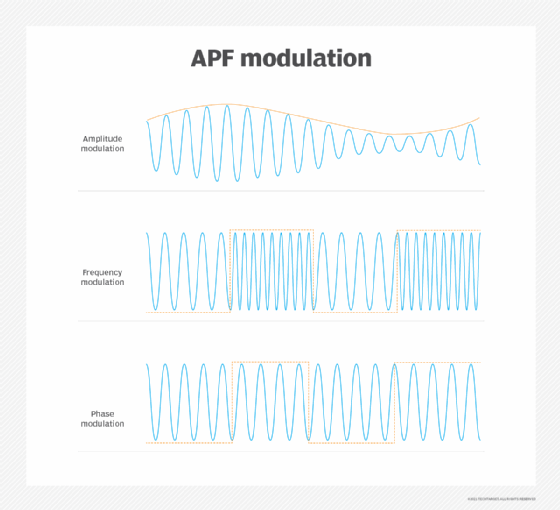What is modulation?
Modulation is the process of converting data into radio waves by adding information to an electronic or optical carrier signal. A carrier signal is one with a steady waveform (a constant amplitude and frequency).
How modulation works
When modulation adds information to a carrier signal, it adjusts one of its qualities. Properties of carrier signals that modulation can alter include the following:
- Amplitude.
- Frequency.
- Phase.
- Polarization.
- Quantum-level phenomena, such as spin.
The modulation device typically applies modulation to electromagnetic signals. Common examples include radio waves, lasers and optics, and computer networks. However, other modulation applications exist, such as the following:
- Direct current modulation. Treats the direct current as a degenerate carrier wave with a fixed waveform of 0 Hz -- mainly by turning it on and off, as in Morse code telegraphy or a digital current loop interface.
- Digital baseband modulation. Encodes a stream of bits into a single channel without using a carrier wave to enable data transmission.
- Low-frequency alternating currents. Occurs at frequencies between 50-60 Hz, as with powerline networking.
Types of modulation
Many modulation methods exist. Common types of modulation include the following:
- Amplitude modulation (AM). The signal carrier's height -- such as the strength or intensity -- varies to represent the data added to the signal.
- Frequency modulation (FM). The carrier waveform's frequency varies to reflect the data's frequency.
- Phase modulation (PM). The phase of the carrier waveform varies to match the amplitude of the input signal. PM is similar to FM.
- Polarization modulation. The optical carrier signal's angle of rotation varies to reflect the transmitted data.
- Pulse-code modulation. Converts an analog signal to digital form to derive a data stream.
- Quadrature amplitude modulation. QAM combines one AM and one PM signal into one signal within one channel over the same frequency band to increase bandwidth.

Modulation also differs based on schemes -- the methods used to translate bits into signals. Modulation schemes can be either analog or digital.
- Analog scheme. Has an input wave that continuously varies, like a sine wave.
- Digital modulation scheme. Samples audio at a certain rate and then compresses the data to turn it into a bit stream. The bit stream becomes a wave superimposed on the carrier signal.
Radio and analog television broadcasts typically use AM or FM. Most short-range two-way radios -- up to tens of miles -- use FM. Longer-range two-way radios -- up to hundreds or thousands of miles -- use a mode known as single sideband.
More complex forms of modulation include phase-shift keying (PSK) and QAM. Modern TVs use QAM, while Wi-Fi modulation uses a combination of PSK and QAM64 or QAM256 to encode multiple bits of information into each transmitted symbol.
PSK conveys data by modulating the carrier signal's phase and alters the sine and cosine inputs at precise times. PSK is most widely used for wireless LANs, RFID and Bluetooth communications. The demodulator determines the phase of the received signal and translates it back to the symbol it represents.
Modulation vs. demodulation
Modulation is the process of encoding information in a transmitted signal. Demodulation, on the other hand, is the process of extracting information from that signal. Many factors influence how faithfully the extracted information replicates the original input information. Electromagnetic interference degrades signals and makes the original signal impossible to extract. Demodulators typically include multiple amplification and filtering stages to eliminate interference.
A modem is a device that performs both modulation and demodulation. The name comes from combining the first few letters of modulator and demodulator.
A computer audio modem enables a computer to connect to another computer or to a data network over a regular analog phone line. It accomplishes this by using the data signal to modulate an analog audio tone. The modem at the far end demodulates the audio signal to recover the data stream. A cable modem uses network data to modulate and demodulate the cable service carrier signal.
Sometimes a carrier signal can carry more than one modulating information stream. Multiplexing combines the streams onto a single carrier. Multiplexing techniques include the following:
- Time-division multiplexing. Encodes a fixed-duration segment of one stream, then the next, and cycles through all the channels before it returns to the first.
- Frequency-division multiplexing. FDM uses multiple carriers of different frequencies on the same medium.
- Wavelength-division multiplexing. Modulates multiple laser wavelengths and frequencies on long-haul fiber links to increase the total available bandwidth.
Modulation uses in communications
Multiple carriers of different frequencies can transmit data over a single medium. An independent signal must modulate each carrier. For example, Wi-Fi uses individual channels to simultaneously transmit data to and from multiple clients.
Another use case for modulation is radio transmission. A carrier signal that has higher frequencies typically has a shorter wavelength to enable efficient transmission and reception. The optimal antenna size is one-half or one-quarter of a wavelength, so an audio frequency of 3000 Hz needs a wavelength of 100 km and a 25-kilometer antenna. Instead, with an FM carrier of 100 MHz with a wavelength of 3 meters, the antenna only needs to be 80 cm long.
Radio frequency (RF) transmissions use a carrier wave that doesn't carry much information itself, so the shape of the carrier wave changes by superimposing another wave on it to include speech or data. A transducer converts the audio signal into an electric signal to transmit sound, which then modulates a carrier signal.
Modulation and duty cycle
In wireless communications, the duty cycle is the proportion of time the wireless network transmits RF signals. The duty cycle is an important factor because it assesses the extent of a person's exposure to electromagnetic radiation. The actual duty cycle varies, depending on the network's data load speed. Other network uses, such as VoIP or streaming videos, also affect the duty cycle.





